Wed Oct 15, 2008 9:00 pm
But, it's a good thing he did. For, ignoring my anguish, we found...
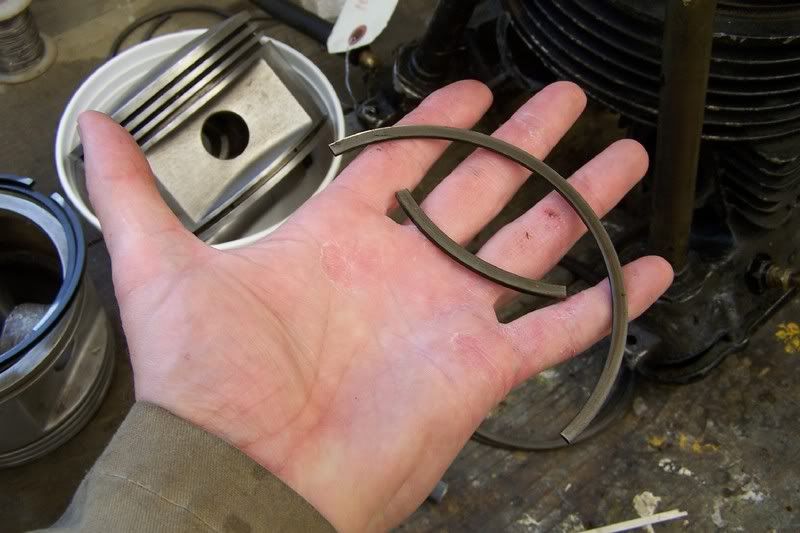
Although strangely, they hadn't marked up the cylinder. Warners are tough, and the clearances are not too tight.

Although strangely, they hadn't marked up the cylinder. Warners are tough, and the clearances are not too tight.
Wed Oct 15, 2008 9:09 pm
But the most surprising thing was yet to come... Stan turned-over the cylinder on the workbench, and metals things fell out. (In the world of engine overhauls, this is never a good sign!) Three big slugs. On closer inspection, they appeared to be pieces of an exhaust valve. Yet all the valves are working on this engine now, because there was at least moderate compression on all 7 cylinders.
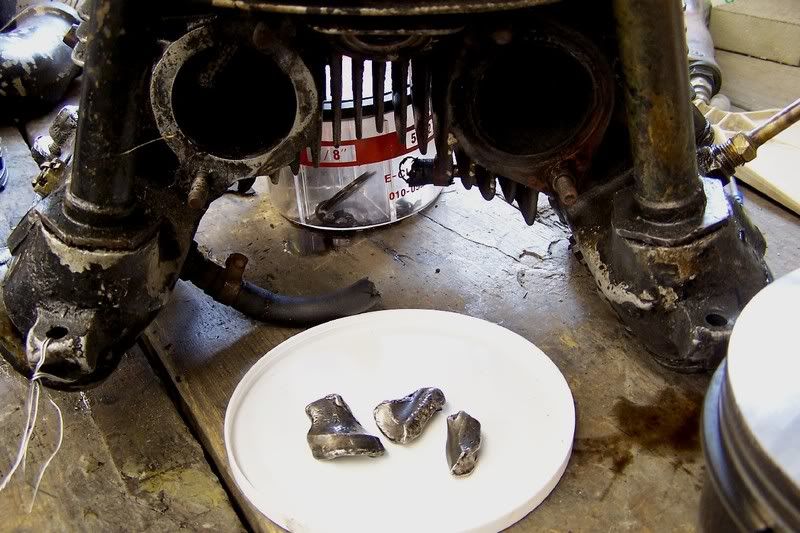
We perused the logbooks and talked to the previous owner, and found it had swallowed a valve in 1983 or so. 25 years ago! All this time, these pieces have sat in the next cylinder head, just lying there, held by gravity away from the pistoning valve, with never an interfering moment. Not once did they ever bounce up and stop the valve from closing -- the valve works perfectly and is unmarked.
Astounding...

We perused the logbooks and talked to the previous owner, and found it had swallowed a valve in 1983 or so. 25 years ago! All this time, these pieces have sat in the next cylinder head, just lying there, held by gravity away from the pistoning valve, with never an interfering moment. Not once did they ever bounce up and stop the valve from closing -- the valve works perfectly and is unmarked.
Astounding...
Wed Oct 15, 2008 9:14 pm
However, that's OK. We'll just accept good fortune and keep moving along.
Here are the 3 pistons, cleaned and inspected and ready to go back in with new rings. (The Old Spitfire Pilot was a devoted parts collector.)
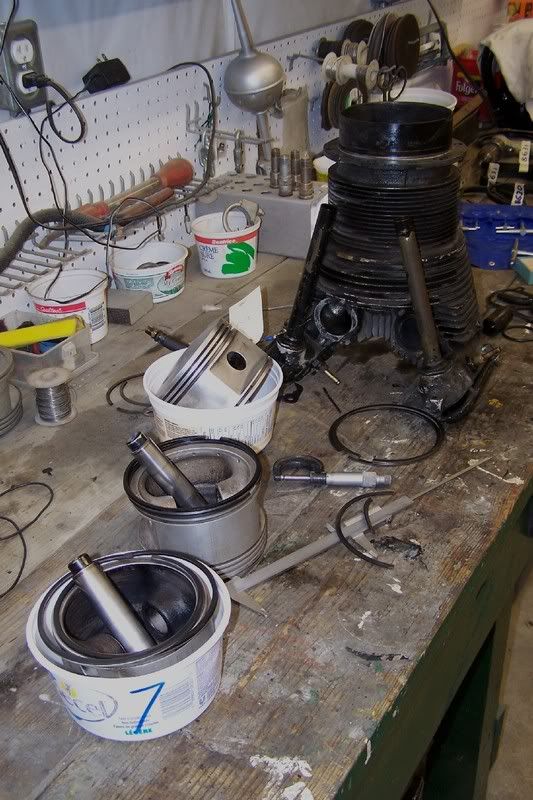
Here are the 3 pistons, cleaned and inspected and ready to go back in with new rings. (The Old Spitfire Pilot was a devoted parts collector.)

Wed Oct 15, 2008 9:19 pm
So I got busy and started cleaning up some surface-rust issues. (This airplane sat in an open-front dirt-floor hangar for a very long time. The fabric is great, but the metal needs to be cleaned up immediately.)
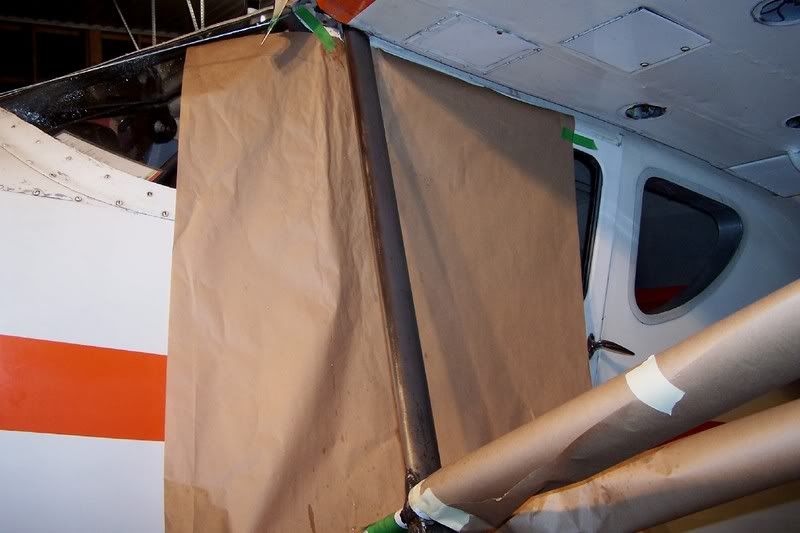

Thu Oct 16, 2008 8:47 am
Warner parts are always tough to come by, especially so for the 125 and 145 models. We had an issue this past spring with our 145 with only 290 hrs on it since major. We used an Eclipse Y-150 starter. Scarce as hens teeth. Warners have a nasty habit of kicking back on start. Every Warner I have dealt with is this way. Unfortunately, one of the weakest points in the engine is the starter drive in the rear accessory case. Our starter gradually began to get weaker and weaker. We do not have a generator so always had to keep the battery charged. Well, the starter finally gave up the ghost and quit working.
I removed the starter (not an easy project in a Waco RNF as the entire oil tank and connections must come out first). The old starter was literally dripping oil...not a good sign and a good explination of why it quit working. Installed new overhauled starter I had for our second RNF project. It didn't work! I could hear it whine but it did not engage. The first thing we did was grab the starter drive and try to turn the prop and I was unable to hold it so "assumed" that was not the issue. Kept flying airplane for about 6 hrs more by simply propping it then winter set in. Sent original starter out for overhaul and re-installed. Same issue. Would whine when you hit the starter switch but no prop movement. Took everything back off and grabbed the drive again. This time I could hold the drive steady while another pulled the prop through. BAD NEWS.
Removed engine and took it to a well-known Warner man who no longer will overhaul them but was willing to look at the engine. Well, had to replace the drive gear as the old one had sheared the pins due to the kickbacks. However, we found metal shavings in the oil sump meaning the bearing was starting to go. Here is where we found the real issue....no one wants to touch a Warner anymore. Finally have found someone to do a teardown inspection and replace the bearing. We replaced the engine with the O SMOH engine we had for RNF #2. We have decided not to use a starter as this was an $$$$EXPENSIVE lesson. Good luck with your Warner as I feel your pain!!!!!
I removed the starter (not an easy project in a Waco RNF as the entire oil tank and connections must come out first). The old starter was literally dripping oil...not a good sign and a good explination of why it quit working. Installed new overhauled starter I had for our second RNF project. It didn't work! I could hear it whine but it did not engage. The first thing we did was grab the starter drive and try to turn the prop and I was unable to hold it so "assumed" that was not the issue. Kept flying airplane for about 6 hrs more by simply propping it then winter set in. Sent original starter out for overhaul and re-installed. Same issue. Would whine when you hit the starter switch but no prop movement. Took everything back off and grabbed the drive again. This time I could hold the drive steady while another pulled the prop through. BAD NEWS.
Removed engine and took it to a well-known Warner man who no longer will overhaul them but was willing to look at the engine. Well, had to replace the drive gear as the old one had sheared the pins due to the kickbacks. However, we found metal shavings in the oil sump meaning the bearing was starting to go. Here is where we found the real issue....no one wants to touch a Warner anymore. Finally have found someone to do a teardown inspection and replace the bearing. We replaced the engine with the O SMOH engine we had for RNF #2. We have decided not to use a starter as this was an $$$$EXPENSIVE lesson. Good luck with your Warner as I feel your pain!!!!!
Thu Oct 16, 2008 8:56 pm
Sorry to hear about your starter troubles. The Old Spitfire Guy warned me about kickback and starter damage. I imagine you're way ahead of me on this one, but he modified his 185 Warner with a Spark Retard for starting. I must say it makes a noticeable difference. After it fires up, and you advance the spark, the whole note/tone of the engine changes. He also advised to let 2 blades go by before selecting the mags to ON, so that the assembly had a bit of momentum.
But I'm probably teaching you how to suck eggs.
There is a lever on the back of each mag. This is what is actuated by the spark retard control in the cockpit. In the instrument panel photo on Page 1 of this thread, its the bare-metal handle (looks like a park brake) under the panel on the left side.
Dave
But I'm probably teaching you how to suck eggs.
There is a lever on the back of each mag. This is what is actuated by the spark retard control in the cockpit. In the instrument panel photo on Page 1 of this thread, its the bare-metal handle (looks like a park brake) under the panel on the left side.
Dave
Thu Oct 16, 2008 10:23 pm
Yep....another RNF we were selling for Roy Shofner of P-38 "Glacier Girl" fame had the spark retard lever as per original. We safty wired our mags into the retard position. I did not hear about all the kick back issues until we were well into using the starter (the airplane came with one that had never been hooked up since installed 5 years previously). At this point I am just too afraid that this will happen again and I do not mind propping the Waco. If it was a bigger radial engine then I would probably go back to a starter.
I wish you the best of luck with your Warner and the Fairchild!!!!!
I wish you the best of luck with your Warner and the Fairchild!!!!!
Fri Oct 17, 2008 7:35 am
Wacoykc,
I'm not sure how you can get rated power out of the engine with the spark in full retard. The Warner manual is clear about it, fully retard for starting, then fully advanced for takeoff.
Dave
I'm not sure how you can get rated power out of the engine with the spark in full retard. The Warner manual is clear about it, fully retard for starting, then fully advanced for takeoff.
Dave
Fri Oct 17, 2008 7:47 am
You are correct about that. The engine at full power with the particular prop we are using turns up about 1850rpm at full power. Cruise is at 1750 and indicates an honest 100mph. The reason for this is there is no spark control mechanism installed at all when the airplane was restored. There is also no mixture control. Full rich all the time.
Fri Oct 17, 2008 7:49 am
Hmmm... I don't know how I missed this thread previously. Fun stuff. Thanks for a good read so far!
Ryan
Ryan
Fri Oct 17, 2008 10:24 pm
Wacoykc,
At the hangar on Monday I'll try to photograph the spark advance/retard linkage. From what I can see (my vast 9 hours flying time behind a Warner, I know, but ask me next fall!) it's a very desirable option.
Dave
At the hangar on Monday I'll try to photograph the spark advance/retard linkage. From what I can see (my vast 9 hours flying time behind a Warner, I know, but ask me next fall!) it's a very desirable option.
Dave
Sat Oct 18, 2008 8:35 am
That would be great as we are considering putting it on RNF #2. I think I may have found an actual spark retard lever and it would be interesting to see if it makes much difference.
Mon Oct 27, 2008 9:17 pm
Well it's very hard to take a photo of the spark retard linkage. There isn't much elbow room at the back of the engine.
But in this view of the cockpit you can see the handle, extended into the Retard position, bottom-left of the panel, occluding the park brake.
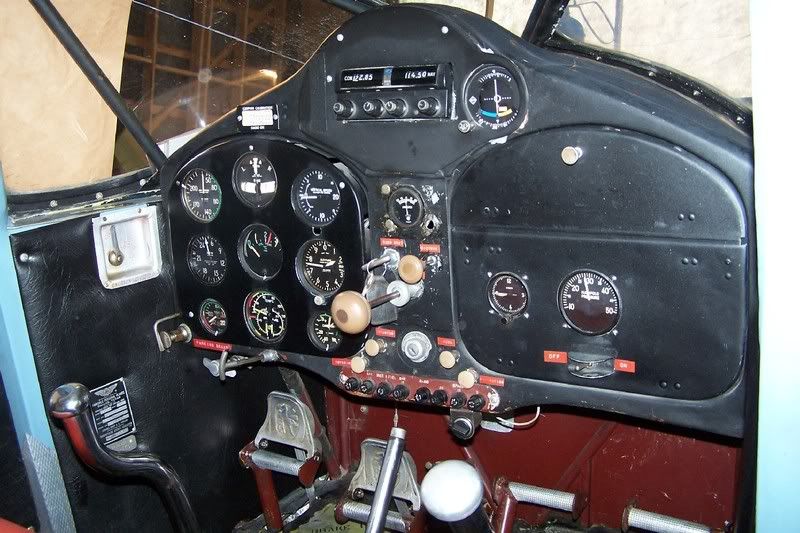
This odd shot is from below, with the camera resting on the floor looking up at the panel. It shows the linkage running to the firewall. As you can see, pretty simple.
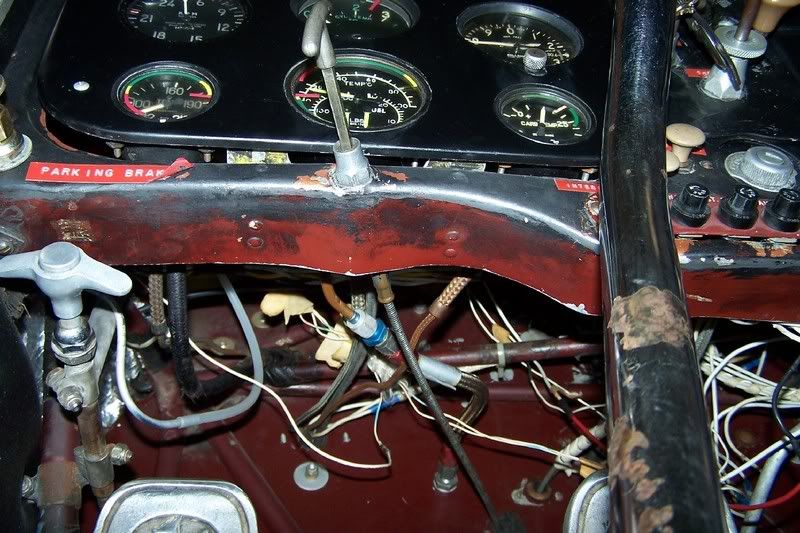
This cluttered shot shows the back of one of the mags. That arm is connected to a linkage clamped very simply to one of the engine mount arms, which moves the two advance/retard discs together.
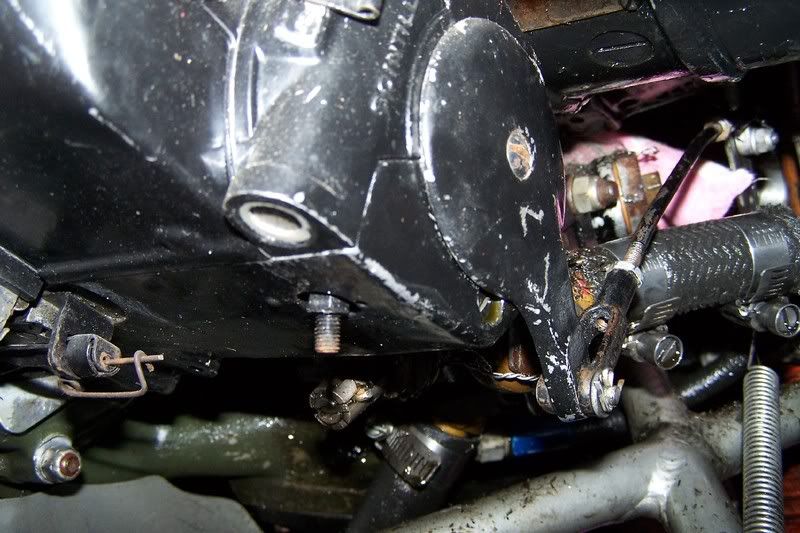
But in this view of the cockpit you can see the handle, extended into the Retard position, bottom-left of the panel, occluding the park brake.

This odd shot is from below, with the camera resting on the floor looking up at the panel. It shows the linkage running to the firewall. As you can see, pretty simple.

This cluttered shot shows the back of one of the mags. That arm is connected to a linkage clamped very simply to one of the engine mount arms, which moves the two advance/retard discs together.

Mon Oct 27, 2008 9:26 pm
Changing a tire should be simple and easy. Hah! It isn't always, by any means. In this case the rim doesn't spilt, so the tire beads have to come over the edge.
We had to rig a tire machine out of odds and ends to deal with the increased stiffness of the tire. The original was 6-ply. (See all the cracks?)
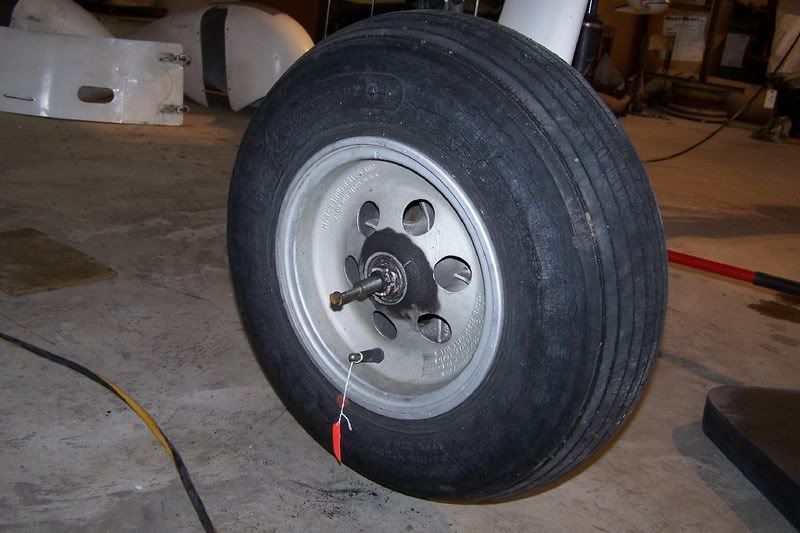
Then we wrestled with 8-ply rubber for an hour, 2 men sweating. The spindle came out of a tractor 3-point hitch. And by using a long tire iron under the bead, and rotating around the spindle, prying hard, we made it work.
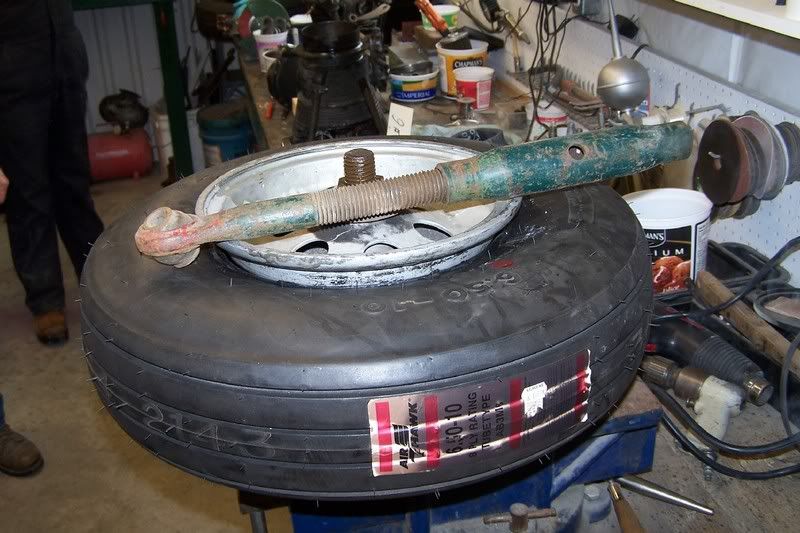
Much better sight! (But not my knuckles!)
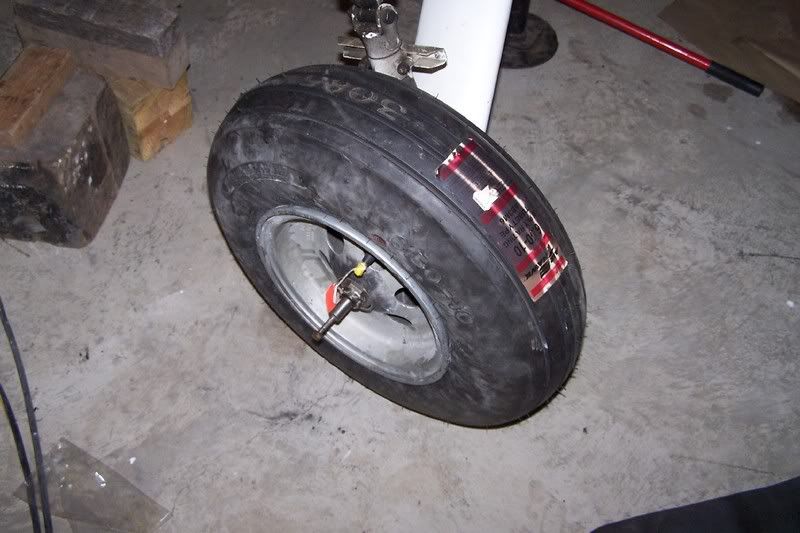
We had to rig a tire machine out of odds and ends to deal with the increased stiffness of the tire. The original was 6-ply. (See all the cracks?)

Then we wrestled with 8-ply rubber for an hour, 2 men sweating. The spindle came out of a tractor 3-point hitch. And by using a long tire iron under the bead, and rotating around the spindle, prying hard, we made it work.

Much better sight! (But not my knuckles!)

Mon Oct 27, 2008 10:00 pm
Hey Dave, I thought I would check in. Looks like you have been very busy working on the old girl. Very interesting.
Eric
Eric